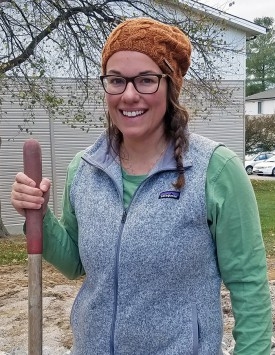Dr. Lauren Wind
PHD FELLOW GRADUATE | Global Change Center
VT Graduate December 2020, Biological Systems Engineering
PhD Advisor: Dr. Leigh-Anne Krometis
Google Scholar • wlauren@vt.edu

Dr. Lauren Wind, who successfully defended her dissertation, "Tracking Antibiotic Resistance throughout Agroecosystems", December 2020. She currently works as an Artificial Intelligence Solutions Architect- Senior Lead Technologist at Booz Allen Hamilton. Prior to that she was a data scientist, and lead technical expert, at Systems Planning and Analysis, Inc., focusing on risk analysis to our Nation's critical infrastructure networks in Washington, D.C.
Lauren earned her B.S. in Environmental Science from Allegheny College in 2015, where she specialized in soil chemistry and climate change effects on forest nutrient cycling. During her junior year, Lauren was a Semester in Environmental Science fellow at the Marine Biological Laboratory (MBL) in Woods Hole, Massachusetts. It was at the MBL where she realized how important it was to examine human and environmental interactions through interdisciplinary and long-term perspectives. Lauren continued exploring research relating to human health and the environment during her summer 2014 REU experience at Virginia Tech in the Department of Civil and Environmental Engineering. After Allegheny College, Lauren found a niche in the Department of Biological Systems Engineering (BSE) in August 2015 under the co-advisement of Drs. Leigh-Anne Krometis and Cully Hession at Virginia Tech, where she completed her doctoral degree in December of 2020.
Lauren’s M.S. thesis quantified the persistence of antibiotic resistance bacteria (ARBs) from manure-amended agricultural fields. She was part of the interdisciplinary USDA- NIFA project “Reducing Antibiotic Resistance from Farm to Fork”, led by Dr. Amy Pruden. Lauren led the charge for the field experiment and sought out to identify the effects of crop (lettuce, radish) and fertilizer type (inorganic, compost, raw manure) on the incidence and persistence of antibiotic-resistant fecal coliforms, a common family of fecal indicator bacteria used to track the environmental spread of antibiotic resistance. However, quantifying antibiotic resistance relies not only on the culturable bacteria present, but also the presence of antibiotic resistant genes (ARGs).
Increasing evidence links the widespread use of antibiotics in livestock production to the transfer of bacteria carrying ARGs to the broader environment. It is therefore critical to understand the persistence and dissemination of antibiotic resistance in agricultural soils to understand potential threats to consumers. Lauren’s dissertation research began as a continuation from the “Reducing Antibiotic Resistance from Farm to Fork” project by quantifying ARGs associated with the antibiotic resistant fecal coliforms cultured in her MS research. She continued to explore how ARGs spread in the environment, and evaluate the metagenomic characterization of ARGs.
Ultimately, Lauren believes that the antibiotic resistance research occurring today has the ability to save lives tomorrow globally. Participating in the IGC will challenged Lauren to move beyond the laboratory and integrate alternative perspectives in the social, ecological, political, and educational pertaining to research. Lauren plans to continue research where she can communicate the importance of decreasing antibiotic resistance to multiple stakeholders (pharmaceutical companies, physicians, veterinarians, farmers, and consumers).
Last updated April 2024.




